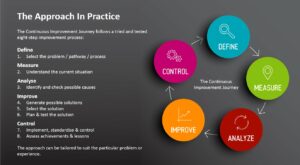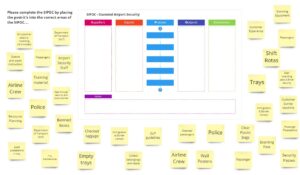Who are we?
The Business Design & Continuous Improvement Team who are part of the wider Service Transformation Team here at Essex County Council (ECC). We've been developing our continuous improvement community of practice over the last few years and in the past year have been looking at opportunities to support and engage the community in different ways.
There are 580 members in our community, who all have different experiences of continuous improvement. We wanted to spend some more focused time as a team, supporting the community and do a refresh for them on our tools and techniques.
We are always looking at different approaches, as we are aware that everyone learns in a different way dependant on their own learning style.

What we are trying to achieve?
There is so much to share about continuous improvement, not least the long list of tools themselves. We decided that instead of trying to share a little bit about everything, we’d break it down into the key phases of the CI journey and focus the whole of July to the phase of Define.
Our hope was that by bringing some focus to it and trying to share 'Define' in different ways, it would help members of the community to think about how they can start a piece of improvement work well.
There are 7 key tools we cover in formal training;
- Project Charter
- Problem Statement
- Goal Statement
- SIPOC
- VOC
- CTQ
- In/Out Frame
Each tool had a dedicated day where the team could share knowledge and advice in their own creative ways.
Some chose to talk a little about the theory by sharing useful templates members could take away and use, others some chose to talk about the tools from a blog perspective to bring it to life, while others offered interactive elements that allowed the community to have a go at it themselves.
We knew that by providing a case study example it would help with people's understanding, but we wanted to choose an example that everyone could relate to and had some knowledge of. We did not want to use one of our own processes, so that that community could learn from (and in most cases re-learn) the methodology, but not get hung up on the process itself.
So, we chose travelling by plane and negotiating airport security, it was something that everyone would have likely experienced in their lives and it didn’t hurt we had a team member that used to work at Stansted Airport either!
The team has extensive knowledge of useful tools, different approaches and experience in many different organisations, we wanted to spend time sharing the knowledge we have.
Sharing the load and getting everyone in the team to lead on a specific tool, gave the community the breadth of experience of the team. This turned out to be a great development opportunity for the team to pull together and share some of our best practices.

What else is on offer?
The other great support available to the community includes;
- Videos on key tools and techniques
- A show case recording of how teams have put this mindset into practice
- Bitesize refresh and introduction sessions
- Continuous improvement escape rooms physical and online
- Yellow belt drop-in sessions
- Method cards
- Offering further development opportunities including the practice leader programme
The practice leader programme is sponsored by our Chief Executive Gavin Jones, who is passionate that continuous improvement is seen as a key capability of the organisation.
It’s an opportunity for those with an increased aptitude for continuous improvement to not only develop their skills and expertise further, but provide benefits to the organisation by being able to lead on improvement projects, embedding a culture of continuous improvement across different services and reduce the need for using expensive external consultants.
What’s next ?
We are still learning and in true continuous improvement style we will now gain feedback on how this month has gone with the community, so we can shape future themed months. We will look at how we can use the content created this month to share in different ways.
If anyone has any feedback on how we ran Define month, or wants to know more about continuous improvement at Essex County Council you can contact us at CI@essex.gov.uk
4 comments
Comment by john mortimer posted on
Continuous improvement can be seen as a set of tools and techniques that help to change and 'improve' our work. But that is a relatively superficial and wasteful design. It assumes that there are special
people out there that 'do continuous improvement'. This was common in the 1980's.
Also, continuous improvement is often targeted at problems that need resolving. These problems can then be sorted, at the expense of affecting other parts of the end to end design of the workflow.
We have learned that true continuous improvement, from Toyota and many progressive organisations today, is about all staff realising that improving their work is part of their job. Part of this focus is to understand how everyone fits into the whole - looking at this systemically.
Therefore continuous improvement becomes part of the mindset of everyone; in particular managers and leaders. The way that communication happens, how teams are formed and work, and how managers engage with their staff, all are focused on continuous improvement as a normal element of their systemic view of themselves in the work.
Comment by Emma posted on
Thanks for your reflections John
Comment by Emma Molloy posted on
Is your community of practice internal to ECC or does it include external organisations/partners?
Comment by Emma posted on
Hi Emma, the community itself is internal to ECC as it's made up of employees who support continuous improvement in the organisation.
Although as a team we do our best to connect ourselves externally with organisations/partners to hear about and share learning, if you wanted to chat further feel free to get in touch via CI@essex.gov.uk